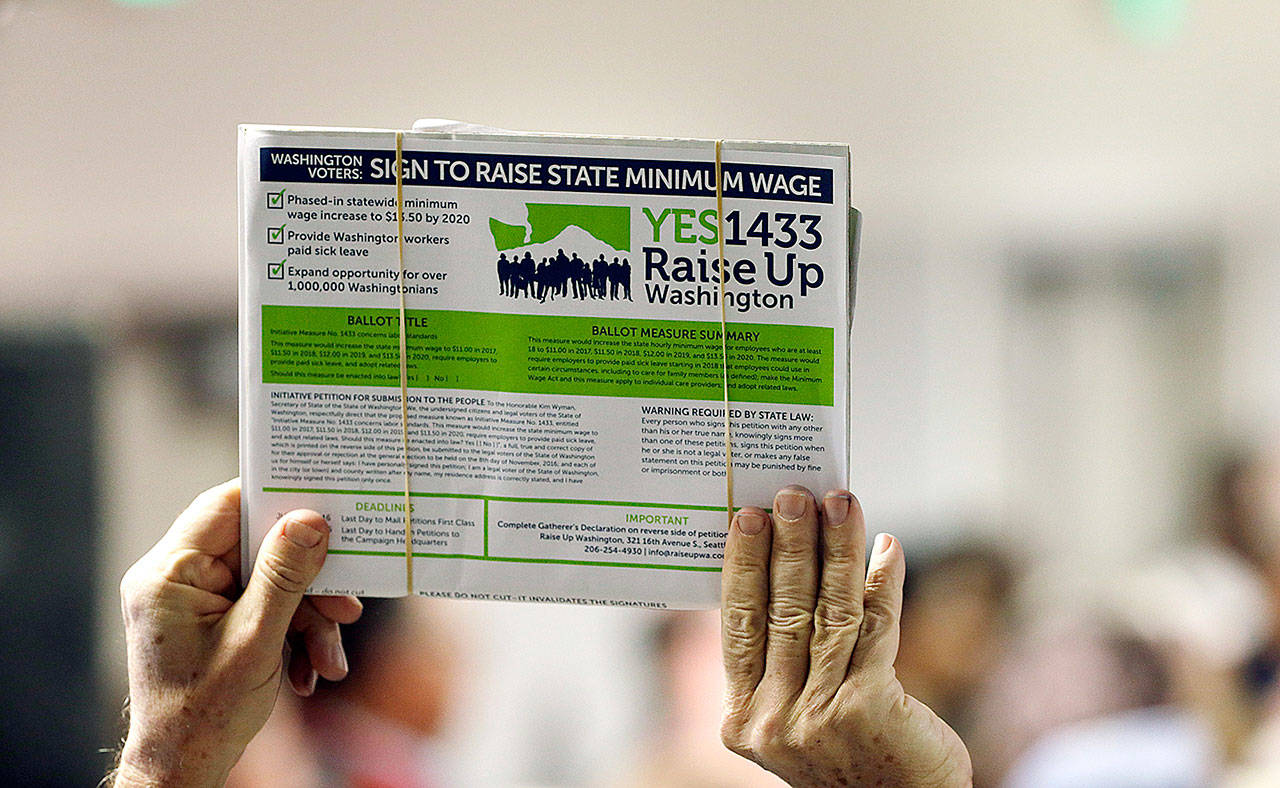By The Herald Editorial Board
Add one more drawback to the use of paid signature gatherers to qualify initiatives and referendums for the ballot in Washington state:
Sometimes the gatherers don’t get paid.
As The Herald’s Jerry Cornfield reported Wednesday, Citizen Solutions, a firm that hires workers to gather voters’ signatures for political petitions, is suing the One Washington Equity Campaign for $1.2 million, claiming that the campaign has yet to pay it $3 for each of the 395,000 “John Hancocks” it collected to put an initiative before the Legislature this year. Initiative 1000 would allow for recruitment goals that consider minority candidates for state jobs, education and contracting, easing state restrictions on affirmative action policies.
Stick with us, this gets a little complicated.
The initiative, which state lawmakers adopted earlier this year, was challenged shortly after its passage by a campaign seeking to put the issue before voters and give them an up-or-down choice. The opponents, Reject R-88 — earlier known as Let People Vote — hired its own signature-gathering firm, National Ballot Access, to put Referendum 88 on the November ballot. The difference: Reject R-88 has made payments to its signature firm, about $887,000, as of July 30, according to the state Public Disclosure Commission.
One Washington Equity Campaign’s unpaid bill is now hanging over efforts to convince voters to approve R-88 to keep I-1000 on the books as adopted.
With One Washington now $1.3 million in debt, an unaffiliated campaign has started up to urge voter support for R-88. But that has raised objections from Citizens Solutions. An attorney for the signature gatherer claims the new campaign, Washington Fairness Campaign to Approve I-1000, should be held liable for the earlier campaign’s debts.
That would be up to a court to decide, but the controversy could color voters’ opinions regarding their decision on R-88’s adoption or rejection of I-1000.
Initiatives and referendums are a cherished part of the state’s history of citizen-initiated legislative efforts, one that voters have taken seriously; any lack of clarity on an issue’s provisions or controversy regarding the campaign often prompt caution among voters and a rejection of the ballot measure.
Christian Sinderman, a consultant for Washington Fairness, admitted as much to Cornfield: “It’s frustrating that this is hanging over the conversation.”
One Washington’s debt could be traced back to its choice in signature gatherers. As Cornfield notes, Initiative 1000 has the backing of high-profile and bipartisan current and former state officials, including Gov. Jay Inslee, and former governors Chris Gregoire, Gary Locke and Dan Evans, as well as Amazon, Microsoft, unions and progressive groups.
Ample donations from that core should have been a gimme, but they lagged, perhaps because of the background of Citizen Solutions, specifically its long relationship with initiative promoter Tim Eyman, who’s responsible for years of ballot measures unpopular with I-1000’s key supporters.
Opponents of paid-signature gathering for ballot measures often are criticized as public policy romantics for believing that money can be removed from citizen initiative process. And the track record for making the ballot does show greater success for measures that employ signature gatherers than volunteer efforts passing around petitions.
Allowing campaigns to pay those collecting signatures has been allowed in the state since 1994, when a lawsuit overturned state law, which had previously held that paying people to gather signatures left the process open to fraud, because some might be pressured to sign who were not registered voters or had already signed.
The Secretary of State’s Office painstakingly works to ensure the validity of signatures, and encourages campaigns to collect additional signatures above the minimum requirement to make up for those that are invalidated.
Yet, doubts about the process go back decades — a century in fact — as seen in editorial in the Eugene (Oregon) Register from 1913 and cited in a 2003 article in the Montana Law Review: “Everyone knows that under the present system petitions do not express real opinion. They are signed for a variety of reasons, among which are a desire to be rid of the solicitor or to help him earn a day’s wages, and the natural tendency to do that which is requested providing it costs nothing.”
The controversy over One Washington’s unpaid bill may now cost I-1000 the support of voters with just the slightest doubt about the measure’s validity and how it was put before the Legislature.
Talk to us
> Give us your news tips.
> Send us a letter to the editor.
> More Herald contact information.

























